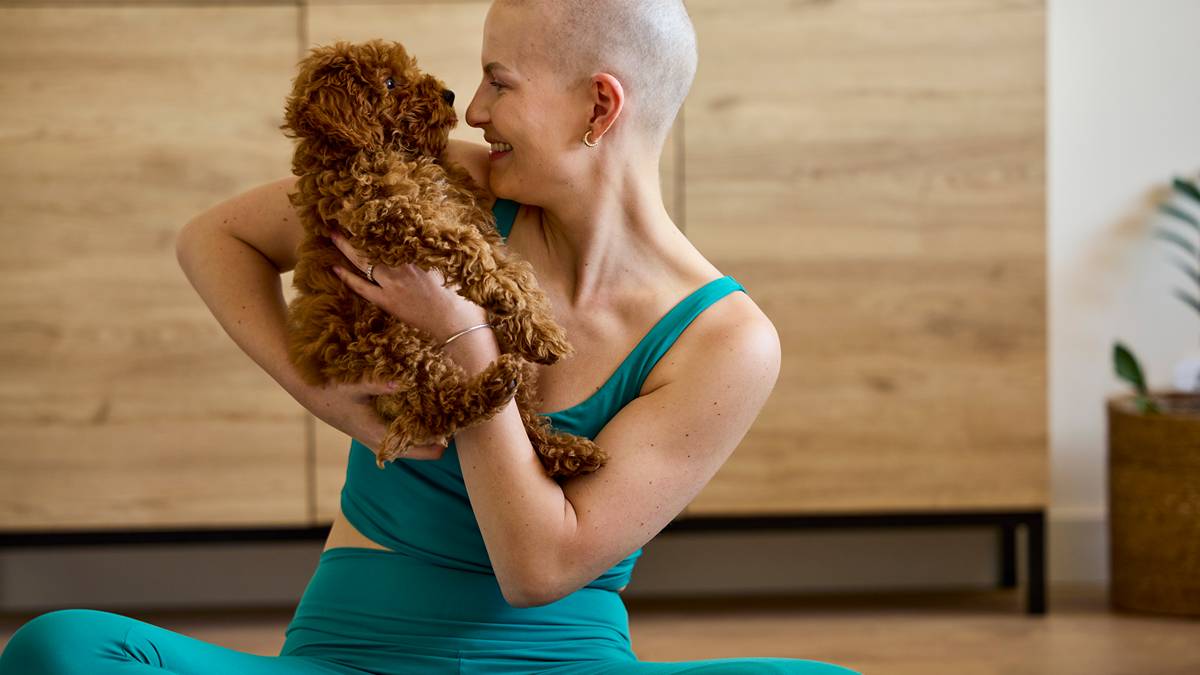Biocurious: Cashed up and pursuing the ‘c’ word, Imugene is on the verge of transforming cancer immunotherapy

Imugene's novel immuno-oncology programs offer hope to cancer sufferers. Pic via Getty.
- Imugene is carrying out three immune-oncology clinical programs that could revolutionise cancer treatment
- The company could be the first to win approval for an allogeneic (off-the-shelf) CAR-T-based solid cancer drug
- After a minimum $20 million raising, Imugene has cash of around $65 million
Barely a day goes by without a tabloid news outlet breathlessly reporting a ‘b’ – breakthrough – cancer therapy and even the ‘c’ – cure word.
Such reports usually offer only false hope to patients because typically the ‘g’ – groundbreaking – findings are based on ground-floor university research.
In truth, 99% of them won’t progress beyond the petri dish for want of the ‘m’ word – money.
To be fair, you gotta start somewhere and we certainly don’t begrudge the researchers their efforts.
But spare the hype, media brethren!
In the mid stage of development and headed to the pointy end, immunotherapy drug developer Imugene (ASX:IMU) highlights the big licks of money required to bring a drug candidate anywhere near commercialisation – and the other ‘c’ word.
Investors just need the ‘p’ word – patience – in Job-like quantities.
Don’t forget your cheque book
Last month, Imugene won overwhelming shareholder approval for a $20 million convertible note issue to CVI Investments Inc., an affiliate of existing investor Heights Capital Management.
In addition, CVI can convert $26 million of warrants into shares over five years.
Companies often shun convertible notes, owing to overly generous coupon rates and debt-to-equity terms which enable an investor to gain control of a company on the cheap.
Initiated by CVI, the deal avoids pitfalls of other convertible note issues: zero interest and the conversion struck at a 25% premium: 5 cents per share versus the prevailing 4 cents.
As with most drug developers Imugene has been to the well more times than a camel in the Gobi Desert, having raised $53 million in 2023 and $80 million in 2020.
But cash is king and with around $65 million in the bank, Imugene is one of the best-funded ASX biotechs as it furthers its three key programs.
Tricking up the T-cells
CEO Leslie Chong says two of Imugene’s company-moving programs relate to the innovative use of CAR-T therapies (Azercel) and the CD-19 oncolytic virus (Oncarlytics).
CAR-T therapies involve taking T-cells out of blood and tricking them up with agents that bolster their cancer-busting abilities. They are then re-introduced into the bloodstream.
The re-engineered cells pursue a target, in this case the CD-19 protein expressed by blood cancers.
To date, the approved therapies have been autologous, which means the patient provides their own cells.
The Azercel program focuses on the allogeneic (allo) approach, by which cells are derived from a healthy donor. They are then modified and multiplied in a lab before being frozen and shipped to trial sites for ‘off the shelf’ use.
Given one batch makes between 15 and 20 doses, the ‘allo’ approach is like Henry Ford’s mass production of T-model Fords, compared with the previous bespoke assemblage of the jalopies.
So far, the handful of approved CAR-T therapies have been autologous – even though up to 70% of patients fail them.
“Folks go for ‘me too’ things – they don’t like the novelty,’’ says Chong, who adds an allogeneic approval is only a matter of time.
Targeting ‘failed’ autologous patients
Last Friday, Imugene reported two additional ‘complete responses’ from its phase 1b, CD-19 CAR-T trial .
This takes the complete response rate – that is, signs the cancer has disappeared – to four out of seven patients (57%).
The trial enrolled patients who had failed four to five lines of therapy, including autologous CAR-T. The subjects were dosed with Azercel, combined alongside chemotherapy and low-dose interleukin 2.
One of them was still in remission after 60 days, with a 180-day read-out pending.
‘Allo ‘allo! That sounds awfully like the ‘c’ word.
“We want to wait for patients to pass the six-month mark because that’s what patients are looking for,” Chong says.
The ongoing study is being carried out at 13 US sites and the first of five planned local sites. The company this month treated the first Australian participant, at Sydney’s Royal Prince Alfred Hospital.
The study is pitched at US Food and Drug Administration (FDA) clearance for a registrational study in 2025 or 2026.
The ultimate prize is the FDA nod for what would be the first approved allogeneic CAR-T cancer therapy.
Turning solid tumours into therapy targets
Meanwhile, Oncarlytics is a “hotch potch” of various chimeric pox viruses, derived from creatures including raccoons and rabbits.
But don’t worry, they’re synthetic: there’s no chasing mangy bunnies down burrows.
The key to the therapy is that the agent infiltrates and divides only into cancer cells.
The program is based on injecting the goodies directly into the tumour (intratumourally) and intravenously for metastatic tumours.
CD-19 is only expressed in blood cancers, which account for 10% of cancers (the rest are solid tumours).
Imugene’s phase 1b study, dubbed Oasis, involves using a combination therapy to induce solid tumours to express CD-19.
Chong says other drug developers have only dreamed of turning a “targetless” tumour into a bullseye and then obliterating it.
Given that, the program elicited plenty of investor interest at JP Morgans’ life sciences jamboree in San Francisco last month.
Meanwhile, Imugene is running a monotherapy trial, called MAST (as in metastatic advanced solid tumours).
One bile tract cancer patient had a complete response and has been in complete remission for more than two years.
Two melanoma cancer patients had a partial response.
All the way with Big Pharma
Imugene has been ASX-listed for more than 20 years, having morphed from a chip fryer maker and a developer of an e-coli treatment for pigs.
It’s a hard grunt: in late 2021 Imugene was worth close to $3 billion and was the second most valuable ASX biotech behind only CSL.
Now, the company’s worth around $280 million, despite being much more advanced.
Chong realises that Imugene can’t go ‘all the way’ without a big-ticket partnership or being acquired.
Having previously worked at Genentech, Chong says Big Pharma could be interested for two reasons.
“We could be a big ‘allo’ CAR-T game, but we could also change the paradigm of how we treat solid tumours with Oncarlytics.”
When it comes to tetchy shareholders who call her at all hours, Chong’s message on clinical trial progress is HDBU.
That’s ‘head downs, bums up’.
“We are scientists and clinical developers and we need to keep going for our patients,” Chong says.
“We love what we are doing and will keep doing it.”
Related Topics

UNLOCK INSIGHTS
Discover the untold stories of emerging ASX stocks.
Daily news and expert analysis, it's free to subscribe.
By proceeding, you confirm you understand that we handle personal information in accordance with our Privacy Policy.








